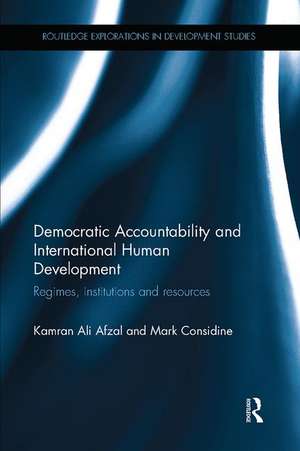Democratic Accountability and International Human Development: Regimes, institutions and resources: Routledge Explorations in Development Studies
Autor Kamran Afzal, Mark Considineen Limba Engleză Paperback – 10 apr 2017
The book shows how the broader paradigm of democratic accountability – extending beyond political democracy to also include bureaucratic and judicial institutions as well as taxation and other modes of resource mobilisation – can best explain how states allocate public resources for human development. Combining cross-country regression analysis with exemplary case studies from Pakistan, India, Botswana and Argentina, the book demonstrates that enhancing human capabilities requires not only effective party competition and fair elections, but also a particular nesting of public organisational structures that are tied to taxpaying citizens in an undisturbed chain of accountability. It draws out vital lessons for institutional design and our approach to the question of human development, particularly in the less developed states.
This book will be of great interest to postgraduate students and researchers in the fields of political economy, public policy, governance, and development. It also provides valuable insights for those working in the international relations field, including inside major aid and investment organisations.
| Toate formatele și edițiile | Preț | Express |
|---|---|---|
| Paperback (1) | 389.38 lei 6-8 săpt. | |
| Taylor & Francis – 10 apr 2017 | 389.38 lei 6-8 săpt. | |
| Hardback (1) | 1166.01 lei 6-8 săpt. | |
| Taylor & Francis – 5 dec 2014 | 1166.01 lei 6-8 săpt. |
Din seria Routledge Explorations in Development Studies
- 8%
 Preț: 389.79 lei
Preț: 389.79 lei -
 Preț: 310.45 lei
Preț: 310.45 lei -
 Preț: 325.72 lei
Preț: 325.72 lei -
 Preț: 325.72 lei
Preț: 325.72 lei -
 Preț: 152.55 lei
Preț: 152.55 lei -
 Preț: 155.43 lei
Preț: 155.43 lei -
 Preț: 311.41 lei
Preț: 311.41 lei - 8%
 Preț: 388.91 lei
Preț: 388.91 lei -
 Preț: 326.96 lei
Preț: 326.96 lei -
 Preț: 311.41 lei
Preț: 311.41 lei -
 Preț: 281.97 lei
Preț: 281.97 lei -
 Preț: 324.67 lei
Preț: 324.67 lei -
 Preț: 489.26 lei
Preț: 489.26 lei -
 Preț: 485.40 lei
Preț: 485.40 lei -
 Preț: 416.22 lei
Preț: 416.22 lei - 28%
 Preț: 821.06 lei
Preț: 821.06 lei -
 Preț: 389.38 lei
Preț: 389.38 lei - 18%
 Preț: 1000.27 lei
Preț: 1000.27 lei - 18%
 Preț: 998.71 lei
Preț: 998.71 lei - 26%
 Preț: 848.96 lei
Preț: 848.96 lei - 18%
 Preț: 1000.27 lei
Preț: 1000.27 lei - 18%
 Preț: 999.61 lei
Preț: 999.61 lei - 12%
 Preț: 299.87 lei
Preț: 299.87 lei -
 Preț: 299.52 lei
Preț: 299.52 lei -
 Preț: 411.42 lei
Preț: 411.42 lei - 14%
 Preț: 297.99 lei
Preț: 297.99 lei - 18%
 Preț: 1057.05 lei
Preț: 1057.05 lei - 18%
 Preț: 1060.25 lei
Preț: 1060.25 lei - 18%
 Preț: 1170.84 lei
Preț: 1170.84 lei - 18%
 Preț: 1000.27 lei
Preț: 1000.27 lei - 25%
 Preț: 544.50 lei
Preț: 544.50 lei - 31%
 Preț: 765.01 lei
Preț: 765.01 lei - 25%
 Preț: 851.46 lei
Preț: 851.46 lei - 18%
 Preț: 1000.27 lei
Preț: 1000.27 lei - 25%
 Preț: 767.38 lei
Preț: 767.38 lei - 26%
 Preț: 763.78 lei
Preț: 763.78 lei - 14%
 Preț: 301.33 lei
Preț: 301.33 lei - 18%
 Preț: 1110.74 lei
Preț: 1110.74 lei -
 Preț: 485.07 lei
Preț: 485.07 lei
Preț: 389.38 lei
Nou
Puncte Express: 584
Preț estimativ în valută:
74.51€ • 78.00$ • 61.65£
74.51€ • 78.00$ • 61.65£
Carte tipărită la comandă
Livrare economică 05-19 aprilie
Preluare comenzi: 021 569.72.76
Specificații
ISBN-13: 9781138057210
ISBN-10: 1138057215
Pagini: 278
Dimensiuni: 156 x 234 mm
Greutate: 0.45 kg
Ediția:1
Editura: Taylor & Francis
Colecția Routledge
Seria Routledge Explorations in Development Studies
Locul publicării:Oxford, United Kingdom
ISBN-10: 1138057215
Pagini: 278
Dimensiuni: 156 x 234 mm
Greutate: 0.45 kg
Ediția:1
Editura: Taylor & Francis
Colecția Routledge
Seria Routledge Explorations in Development Studies
Locul publicării:Oxford, United Kingdom
Public țintă
PostgraduateCuprins
1. The Centrality of the Human Development Approach 2. Traversing the Known: Potential Determinants of Public Spending and Performance 3. Democratic Accountability and Public Spending on Human Development: A Theoretical Construction 4. What Really Drives Human Development Spending and Outcomes? 5. Why Governments Differ in Spending on Human Development 6. From Increased Democratic Accountability to Better Human Development Outcomes 7. Pakistan and India: Of Military Ballads and Popular Ballots 8. Botswana: A Miracle of Institutions 9. Argentina: A Tale Told by Taxation 10. Conclusion: Ending a Story to Begin Another
Descriere
This book significantly expands the human development approach. It concentrates on public spending for human development and shows how the broader paradigm of public accountability — extending beyond democratic accountability to also include bureaucratic and judicial institutions as well as modes of tax and resource mobilisation — can best explain how states allocate public resources for human development. In this sense, as this book finds, enhancing human capabilities requires not only effective party competition and fair elections, but also a particular nesting of public organisational structures that are tied to taxpaying citizens in an undisturbed chain of accountability. This volume offers some critical lessons for institutional design and the way we approach the question of human development, particularly in the less developed states.










